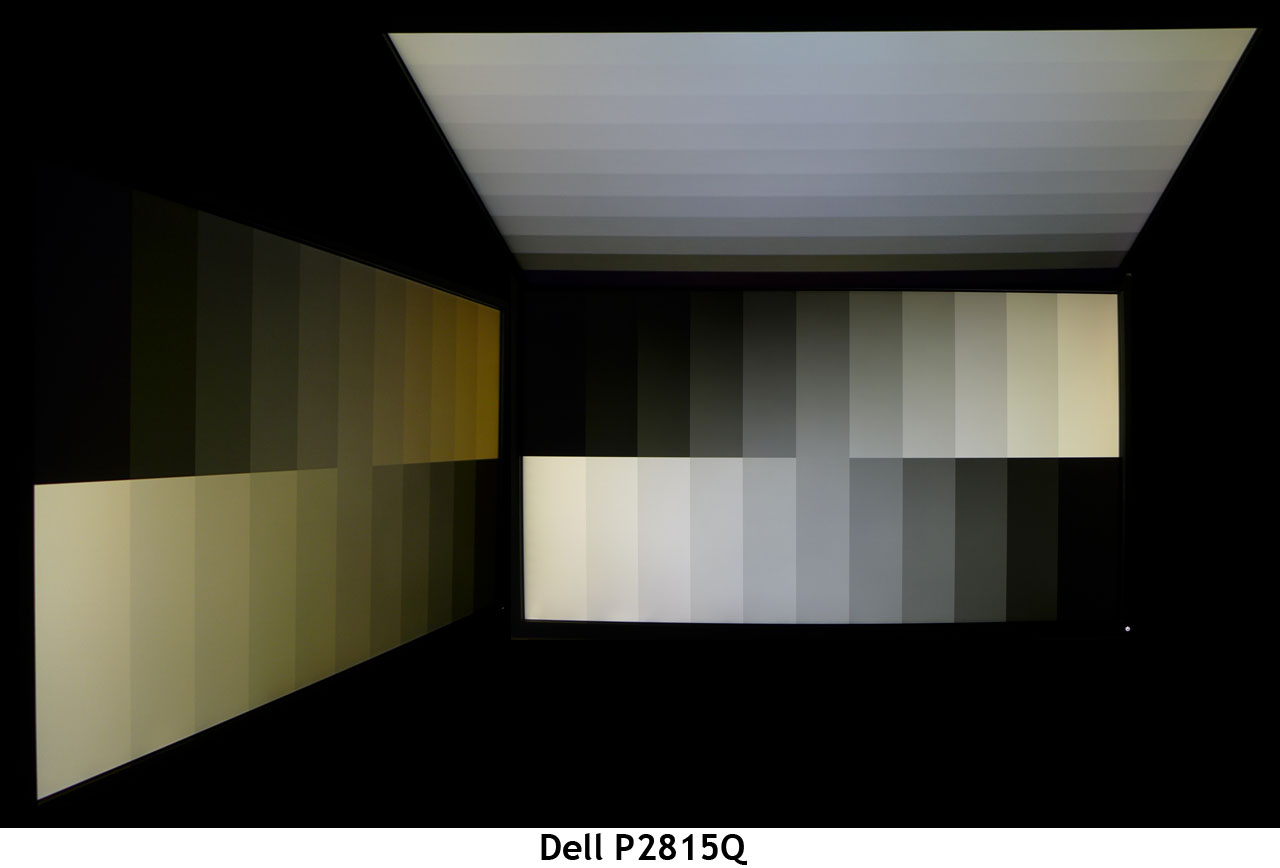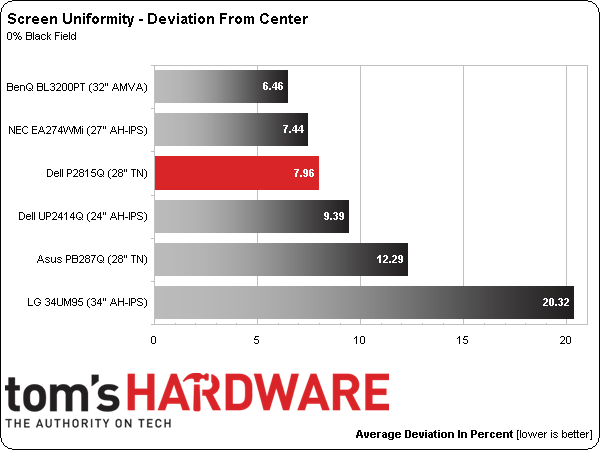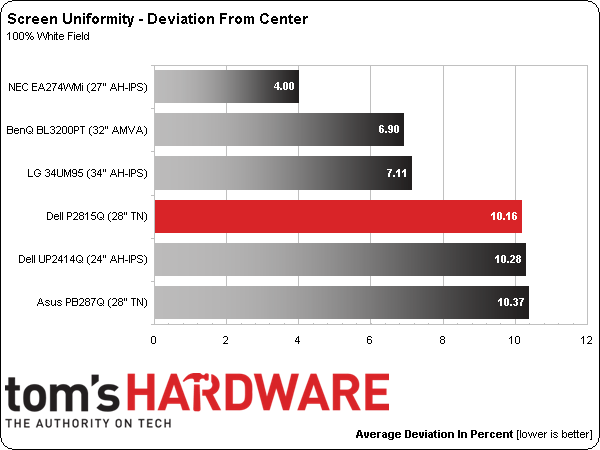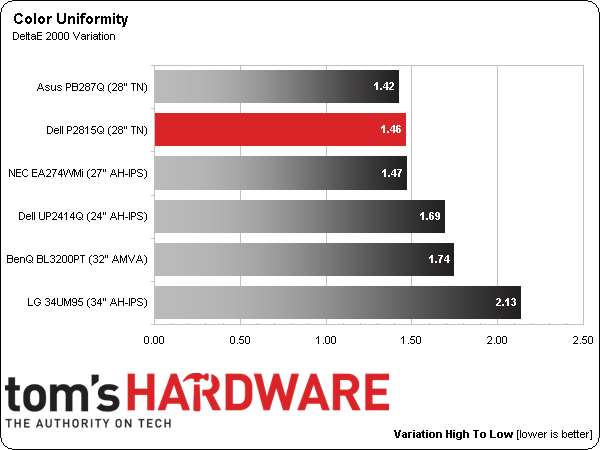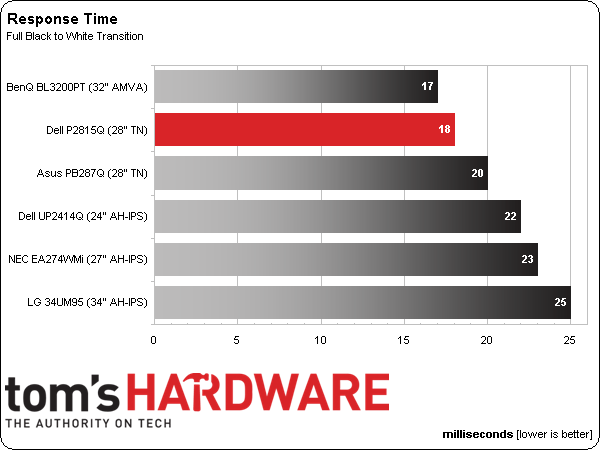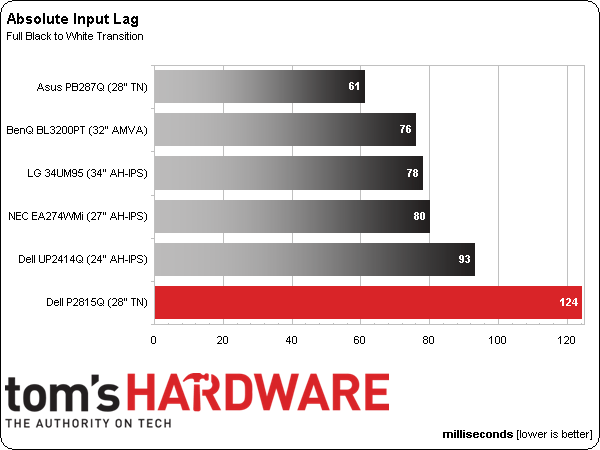Dell P2815Q 28-Inch 4K Ultra HD Monitor Review
Putting a 4K monitor on your desktop means either spending four figures on a 32-inch IGZO screen or going on the cheap with one of the new 28-inch TN-based models. We already reviewed Asus’ PB287Q. Today we look at Dell’s version, the P2815Q.
Why you can trust Tom's Hardware
Results: Viewing Angles And Uniformity
To learn how we measure screen uniformity, please click here.
By using TN panels, Dell and its competitors are pushing 4K resolution into an affordable price range. Poor off-axis image quality is the most significant trade-off. When viewed head-on, TN technology looks fine. But at 45-degree vertical and horizontal positions, the picture degrades quite a bit. To the sides, an obvious red cast comes into play, while from above or below, detail is almost completely wiped out.
Screen Uniformity: Luminance
Our sample returned some of the best results we’ve seen in the black field uniformity test. There is no visible light whatsoever. Instead, you get a smooth continuous tone across the screen. We’ve reviewed a few monitors with uniformity compensation look-up tables that couldn’t do better.
Here’s the white field measurement:
Although this is a good result, it’s rare that any display's uniformity is lower in the white field test. It’s only a nit-pick, however. We still couldn’t see any hotspots on our sample.
Screen Uniformity: Color
Color uniformity is quite low as well. It was a weak point of TN-based monitors in the past, though the newest panels post more impressive results. Aside from the viewing angle issue, there’s no reason not to consider TN if it meets your other needs.
Pixel Response And Input Lag
Please click here to read up on our pixel response and input lag testing procedures.
Get Tom's Hardware's best news and in-depth reviews, straight to your inbox.
We tested the P2815Q at 1920x1080 in order to match the other monitors’ 60Hz refresh rates. At 30Hz, you can expect a result closer to 25 milliseconds. Either way, it slightly bests Asus' effort, which uses the same Chi Mei panel.
The lag results were something of a surprise.
This measurement is more what we’d expect from an HDTV, not a computer monitor. Remember, we’re testing at 60Hz here. Using the P2815Q in its 3840x2160 at 30Hz mode produces so much lag we can see it by just moving the mouse cursor in Windows. Playing Watch Dogs at native resolution is pretty much impossible with a GeForce GTX 780 graphics board. Based solely on the input lag result, we cannot recommend the P2815Q for any kind of motion-oriented gaming.
Current page: Results: Viewing Angles And Uniformity
Prev Page Results: Color Gamut And Performance Next Page Dell P2815Q: 4K On The Cheap (With A Caveat)
Christian Eberle is a Contributing Editor for Tom's Hardware US. He's a veteran reviewer of A/V equipment, specializing in monitors. Christian began his obsession with tech when he built his first PC in 1991, a 286 running DOS 3.0 at a blazing 12MHz. In 2006, he undertook training from the Imaging Science Foundation in video calibration and testing and thus started a passion for precise imaging that persists to this day. He is also a professional musician with a degree from the New England Conservatory as a classical bassoonist which he used to good effect as a performer with the West Point Army Band from 1987 to 2013. He enjoys watching movies and listening to high-end audio in his custom-built home theater and can be seen riding trails near his home on a race-ready ICE VTX recumbent trike. Christian enjoys the endless summer in Florida where he lives with his wife and Chihuahua and plays with orchestras around the state.
-
Avus "Or just go buy a 55" to 65" Samsung 4k TV instead. "Reply
So instead of buying a $430 monitor, you suggest people to buy a $2000+ TV. This is beyond stupid... -
larsoncc "you have to decide exactly what you want your 4K monitor to do"Reply
No I don't. I can always choose not to use the tech until they get it right, and if they never do, eh.. oh well!
High input lag makes this a particularly poor choice. Input lag impacts every task, not just gaming. Forget it.
Gamers are really in an "interesting" place this year. You can't get a video card to drive UHD even with the newest chips, and buying a monitor is a minefield. Sure, you can do SLI to get to UHD, that'll get you most of the way there... except certain games (AC), and immediately after any game's release (Titanfall), and sometimes you'll need lower settings to accommodate VRAM issues (Evil Within). This of course bodes poorly for games to be released in the upcoming year if you're buying now. It's the wait for proper support that's really disappointing (usually good support, but look at Titanfall and CoD Ghosts as long waits).
On the monitor side, you can go to 1440p, and watch as your tech is outdated quickly (as 4K/UHD gets its act together...maybe) - and be permanently stuck with a resolution that doesn't scale 1:1 with 1080p (again, hope you're running good GPUs). In all monitor tech, you can get low response times, or great colors, or take a risk on a foreign vendor's product that MIGHT be tricked into doing both but will still have some blur/ghosting. You can get Variable Refresh tech that'll work with one brand of GPU but not the other. Lightboost/ULMB or 3D support is up for consideration, but can't be used with AS/GSync.
I can't help but think it's all a gigantic mess right now. -
B4vB5 Avus, a 50 inch UE50HU6900 is 750 euro and UHD@60Hz capable. A 55 inch is just 100 euros more in Europe and thus you should be able to find them for the same dollar amount in the US as right now, that pretty much goes for any HW since we Europeans gets charged more and it just happens to fit with the dollar vs slightly more expensive euro 1:1.Reply
-------
I wouldn't be caught dead with this useless monitor in the article. Either go for
- Quality UHD monitor: Dell IPS 32 inch quality, UP3214Q. 1400 usd isch.
- Cheap UHD but not junk: Asus 287 for 28-590 Samsung performance but with a much better stand. If wallmounting get the Samsung and save some cash. 500 usd isch.
- Quality Gaming: Asus 1440p 144Hz super gamer monitor. 1200 usd ish.
- Desktop real estate and best overall choice: Samsung UE50HU6900 for 8ms B2B UHD@60Hz over HDMi 2.0(Require 970/980). 750 usd isch.
I'd pick the TV. -
InvalidError Reply
Outdated quickly? PC display resolution takes about a decade to step up between mainstream standards.14383255 said:On the monitor side, you can go to 1440p, and watch as your tech is outdated quickly (as 4K/UHD gets its act together...maybe) - and be permanently stuck with a resolution that doesn't scale 1:1 with 1080p
Unless all you do with your PC is watch movies, not scaling 1:1 with 1080p is usually a "don't-care" item - people who are bothered by that would not buy into those sort of resolutions in the first place. -
CerianK I picked up the 39" Seiki 4K TV for use as a monitor, patched the BIOS to a modified version of the 50" BIOS that supports 1920x1080p@120Hz (verified and works fine for gaming) and connected it to a Sapphire Dual-X R9 270 using an HDMI to DisplayPort Active Adapter. Fit and finish could be better, but I can't complain about paying $340 (US) for having a giant hi-res 4K desktop and being able to watch 4K videos (what few there are).Reply
If my eyesight were perfect, I might be able to make use of 4K at 32" (or perhaps a little smaller), but the way mine is, 39" rocks! -
10tacle Reply14383255 said:On the monitor side, you can go to 1440p, and watch as your tech is outdated quickly
What in the world are you talking about? The majority of households have only recently been running 1080p monitors (within the past few years), and the majority of gamers game on 1080p according to many gaming site polls, not QHD. It will be years before 1440p gets to be mainstream in households. They are still considered a luxury buy in the PC market and will be for some time. Further, when 1080p monitors were out after a couple of years, prices dropped sharply. That has not happened with QHD monitors outside of the cheap Korean Apple rejects.
It's going to be several years before I feel the need or even want to plunk down cash for not only a decent 4K monitor when they actually come out and are reasonably affordable (<$800US) but the GPU(s) to power it at decent frame rate numbers.
-
Avus Reply14383401 said:Avus, a 50 inch UE50HU6900 is 750 euro and UHD@60Hz capable. A 55 inch is just 100 euros more in Europe and thus you should be able to find them for the same dollar amount in the US as right now, that pretty much goes for any HW since we Europeans gets charged more and it just happens to fit with the dollar vs slightly more expensive euro 1:1.
Your American pricing ("price convertion") for UHD TV is wrong. The cheapest Samsung 50" 4k is around $1300USD. 2nd tier brand 50" 4k is around $1000USD. They are definitely not as cheap as you think.
-
InvalidError Reply
The advent of dirt-cheap 1080p screen relegated practically all other resolutions to niche markets so I seriously doubt QHD will ever become a significant mainstream resolution - the same way inexpensive 1080p practically wiped out 1200p.14383801 said:It will be years before 1440p gets to be mainstream in households. They are still considered a luxury buy in the PC market and will be for some time.
About eight years ago, 1080p and 1200p were both available around $300 but today, 1080p is down to $100-150 while 1200p is still $300-500.
4k will be the next major mainstream resolution about five years from now.
